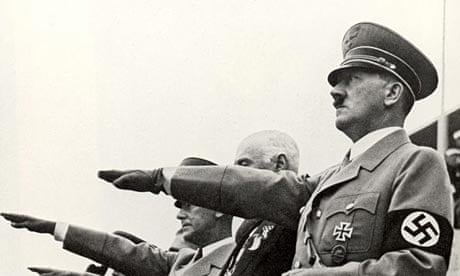Adolf Hitler's rabid antisemitism and virulent nationalism were not directly prompted by his experiences on the western front in the first world war, historical research suggests.
Unpublished letters and a diary written by veterans of Hitler's wartime regiment are among newly unearthed documents that challenge previous notions about how the conflict shaped the future dictator's views.
The documents overturn Hitler's subsequent portrayal of his unit, the List regiment, as united in its intolerance and antisemitism, with Hitler "a hero at its heart". They challenge long-held views on Hitler's supposedly brave war record, revealing that frontline soldiers shunned him as a "rear area pig" based several miles from danger. The papers also disclose that List men saw Hitler as an object of ridicule, joking about him starving in a canned food factory, unable to open a tin with a bayonet. He was viewed by his comrades in regimental HQ as a loner, neither popular nor unpopular.
They noticed that he did not indulge in their favourite pastimes – letter-writing or drinking – but was instead often seen reading a political book or painting, earning him the sobriquet the "painter" or the "artist". He was also viewed as particularly submissive to his superiors.
Perhaps no other individual has been more scrutinised than Hitler, but research on the List regiment by Dr Thomas Weber, lecturer in modern history at Aberdeen University, has unearthed new evidence.
Weber said that previous biographies relied on evidence from Hitler and Nazi propagandists: "Since Hitler was an ordinary soldier in the first world war, there was not an easily available file on him. Biographers didn't dig deep enough."
Within the Bavarian War Archives, Weber discovered papers undisturbed for almost nine decades. Elsewhere, he found unpublished letters and Nazi party membership files, and traced Jewish veterans of the List.
Hitler served as a runner but, armed with new evidence, Weber realised that historians had not distinguished between regimental runners, a relatively safe job, and battalion or company runners, who had to brave machine-gun fire between trenches. Hitler was the former, a runner at regimental HQ, several miles from the front, and living in relative comfort.
In unpublished letters, Alois Schnelldorfer, who also served at the List regiment's HQ, told his parents that his own task was "to sit in an armchair and make calls like a postmistress". He also confirmed the frontline view of more generous provisions than the men in the trenches: "I can drink a litre of beer under a shady walnut tree."
Speaking of Hitler's famous first-class Iron Cross – the second class was a relatively common award – Weber said that this was often received by those in contact with more senior officers, typically those posted to regimental headquarters, rather than combat soldiers. Drawing on an unpublished diary by a Jewish List soldier, the documents also indicate a lack of widespread, virulent antisemitism.
Hitler's Iron Cross was recommended by Hugo Gutmann, a Jewish List adjutant, but Weber discovered that when Gutmann was incarcerated by the Gestapo in 1937, List veterans enabled him to survive.
Gutmann referred to a prison guard who took risks to help him, saying: "As a good Catholic he despised the Nazis." Another List ex-comrade helped Gutmann to escape to America.
Weber also unearthed evidence to show that "the veterans of the List regiment did not – as maintained by all Hitler biographies – unanimously support Hitler after the war.
An unpublished 1934 postcard by a Hitler admirer laments his being cold-shouldered by veterans in 1922. Weber found that few frontline List soldiers became Nazis, whereas several regimental HQ staff became prominent in the party.
Weber concludes that Hitler, who worked for a leftist government after the war, became violently nationalist and antisemitic after Germany's postwar and post-revolutionary economic and political crisis.
His research will be published next month in Hitler's First War, by Oxford University Press.
Professor Ian Kershaw, a leading Hitler biographer, applauded the research for raising "interesting questions", while Professor Conan Fischer, another eminent historian, said: "Weber has ferreted out a wealth of new evidence."
